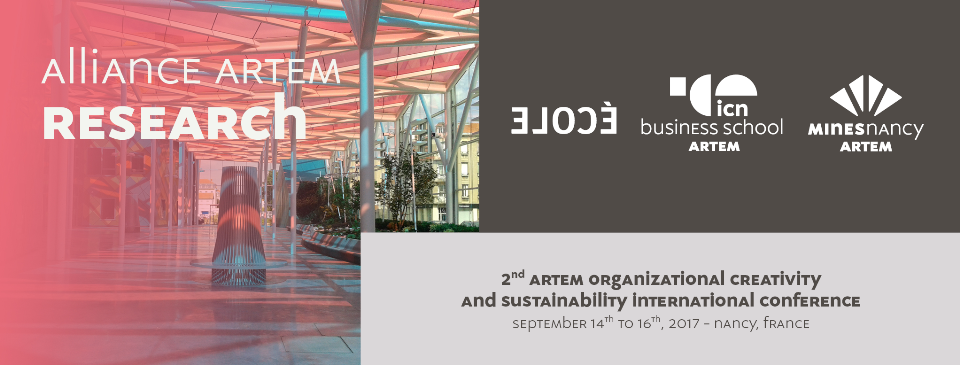
|
|
|
list of sub-themes > sub-theme 1
SUB-THEME 1: ACTIVITY THEORY: CREATIVE AND SUSTAINABLE ORGANIZATIONAL APPROACHES TO LEARNING DEVELOPMENT To upload your abstract, please log in.
convenors: Denise Shelley Newnham Glion Institute of Higher Education, Switzerland
Ellen Carm Oslo and Akershus University of Applied Sciences, Norway
Silke Geithner Dresden University of Technology, Germany
To identify new sustainable and creative ways of dealing with present forms of critical social conditions relying on the multidimensional and holistic developmental approach proposed by Activity Theory.
description: Activity theory is derived from the Marxist school of thought and set out to theorize human learning and development. In activity theory, human actions are studied in historically evolving collective activities, the essence of which reflects the relation “between the human subject, as a social being, and external reality, a relation that is mediated by the process of that reality’s transformation and change” (Davydov, 2008, p.14). It subsequently relies on the perception of history and development as evolving vertically and following predetermined stages. Engeström (1987/2015) opposed such thoughts maintaining that rather than verticality, historicity should be understood as being multi-dimensional and uncertain (Engeström, 1991a). The implication is, that instead of perceiving the “world as needing to be controlled, we should accept that all our designs have unintended consequences and drift in unexpected ways” (Engeström, 2013, p. xv). Activity theory, in comparison to action research, conceptualizes “actions in the broader perspective of their systemic and motivational context and, thus, aims at going beyond a given situation” (Sannino, Daniels, and Guriérrez, 2009, p. 3) through investigation of the practical everyday reality of human beings and their future perspectives. It is a practice-based and future- oriented theory. Furthermore, Engeström (1987/2015) highlights that an activity contains the ability to stabilize and expand. Creativity is the key to an expansive collective future oriented activity and sustainability is present in all its evolving states due to its capacity to both transcend and retain previous layers of the organism. The use of activity theory as a tool to investigate and facilitate human learning and development has vastly transformed from the early works of Vygotsky, Lurai, Leont’ev, Galperin, Zaporozhets and Davydov. Scholars have since extended their investigations and formative transformations (Engeström, 2013) to areas such as NGO’s (Kontinen, 2002); AIDS pandemics (Carm, 2012); Navy ships (Hutchins, 1995); Agriculture (Pereira-Querol, 2011); Organizations and Knowledge management (Newnham, 2016); Interorganizational collaboration (Edwards, 2009); Refugees and Organizations (Newnham, forthcoming) and many more. Such shifts of interests are due to new dynamics within our contemporary society where ways of “learning, accumulating knowledge and passing it on, interacting with changing ways of organizing production and regulating economic activities and social behaviour” (Virkkunen & Newnham, 2013, p. 1) are driven by new motivations, have taken on new meaning, and produce different experiences (Vasilyuk, 1992) and behaviour. In this sub-theme we identify a range of themes concerning activity theory, education, learning and development. We welcome papers; posters and academic debates on themes such as: Expansive forms of learning and development in formal education
keywords: Activity theory, Learning, development, creativity, sustainability, organizations
references: Carn, E. (2012). The role of local leaders in cultural transformation and development. In Compare. A journal of comparative and international education. 42:5, 795-816, DOI:10.1080/03057925.2012.701484 Davydov, V.V. (2008). Problems of Developmental Instruction. A Theoretical and Experimental Psychological study. D. Robbins and V. Lektorsky (Series Eds.), International perspectives in non-classical psychology. New York: Nova Science Publishers. Edwards, A. (2013). From the Systemic to the Relational: Relational Agency and Activity Theory. In A. Sannino; H. Daniels & K.D. Gutiérrez (Eds.), Learning and Expanding with Activity Theory. New York: Cambridge University press, Pp.197-211 Engeström, Y. (1987/2015). Learning by Expanding. An Activity Theoretical Approach to Developmental Research. 2nd edit. New York: Cambridge University Press. Engeström, Y. (2013). Foreword: Formative Interventions for Expansive Learning. In The Change Laboratory. A Tool for Collaborative Development of Work and Education. Belgium: Sense Publishers, Pp. xv-xviii Engeström, Y. (1991a). Developmental Work Research: Restructuring Expertise through Expansive Learning. In M.I. Nurminen & G.R.S.Weir (Eds.), Human jobs and Interfaces. Amsterdam: Elsevier, Pp. 265-290. Hutchins, E. (1995). Cognition in the Wild. Cambridge: MIT Press. Kontinen, T. (2012). Learning Challenges of NGOs in Development. Co-operation of Finnish NGOs in Morogoro, Tanzania. Helsinki: Helsinki University press. Newnham, D.S. (2016). Clivages et passerelles entre chercheurs et praticiens. Étude du fonctionnement d’un « Change Laboratory » au Botswana. In F. Ligozat ; M. Charmillot, & A. Muller (Eds.), «Le partage des savoirs dans les Processus de Recherche en Education ». Raison Educatif No 20, Pp. Newnham, D.S. (2016). The Organization of people in distress: Unprogrammed, unintended and unstructured consequences for refugee women. 32nd EGOS conference, Naples, July 9-11, 2016. Organizing in the Shadow of Power. Pereira-Querol, M. A. (2011). Learning Challenges in Biogas Production for Sustainability. An activity theoretical study of a network from a swine industry chain. 1. ed. Helsinki: Unigrafia, p. 256. Virkkunen, J. & Newnham, D.S. (2013). The Change Laboratory. A Tool for Collaborative Development of Work and Education. Belgium; Sense Publishers. Vasilyuk, F. (1992). The Psychology of experiencing. The Resolutions of Life’s Critical Situations.New York: New York University Press.
|

